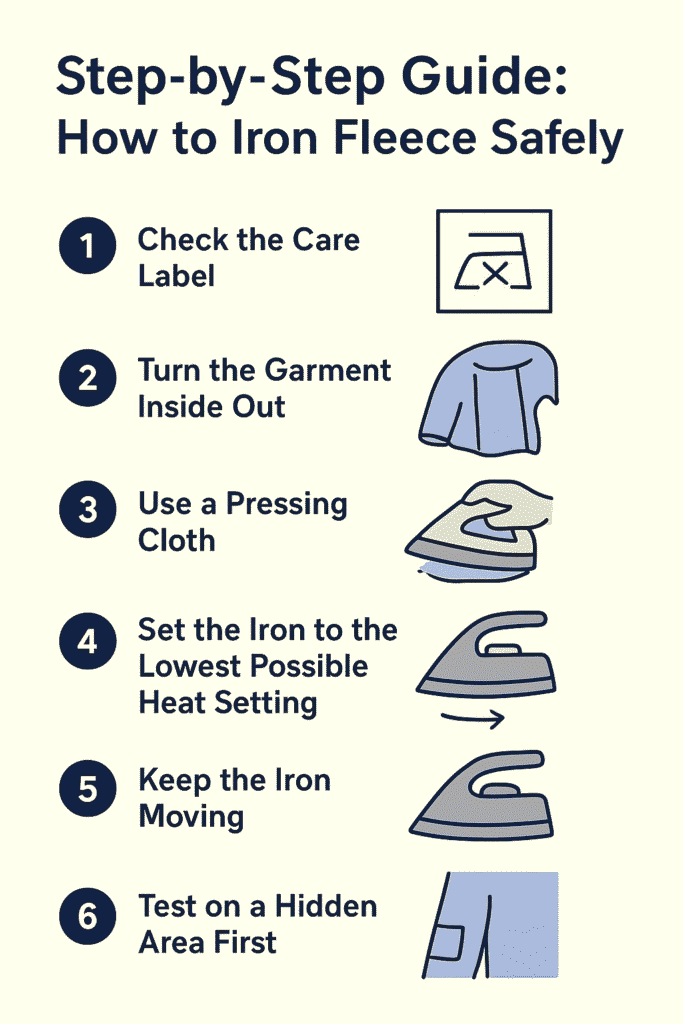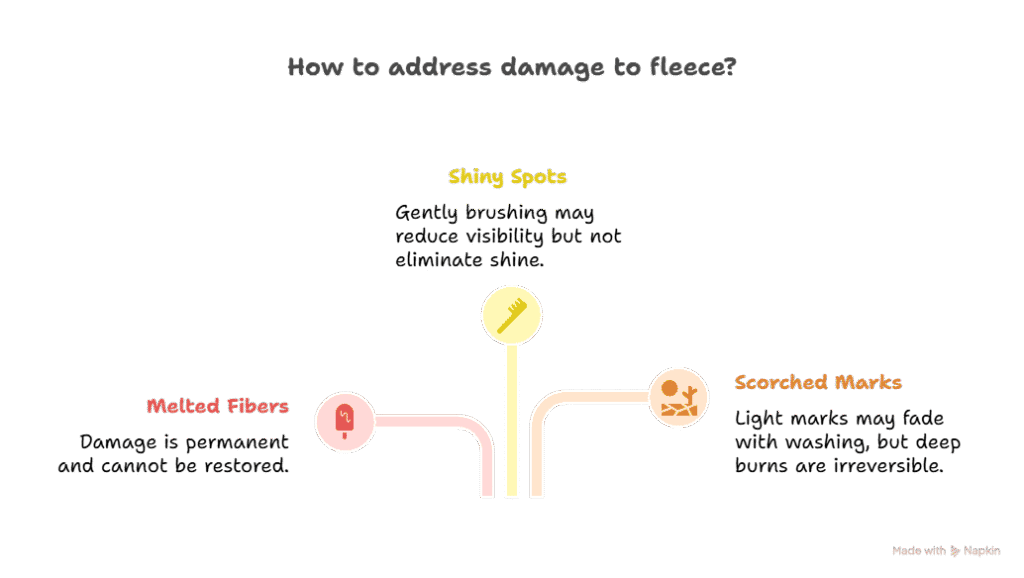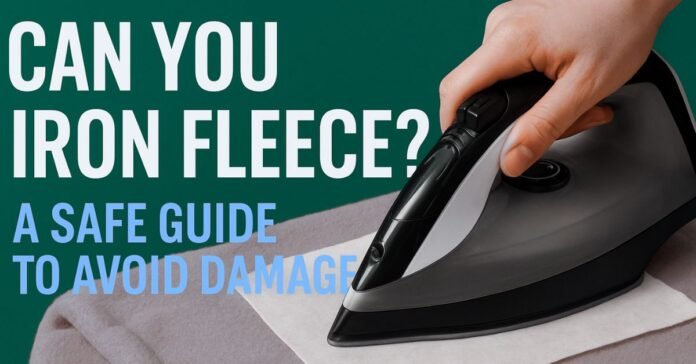Can You Iron Fleece?
It is possible to iron fleece, but it has to be done very carefully so as not to create melted or shiny areas. Fleece is a soft, super warm and light fabric yet ironing it is not easy at all. In contrast to cotton or linen, fleece is normally created out of polyester which is heat sensitive. Even the application of a hot iron may harm the cloth, leaving unattractive reflective points, burn stains or outright fusing the fibers. To maintain your fleece articles, be sure to operate the iron on the lower heat setting, do NOT steam, and use a pressing cloth between the iron and the fleece. These precautions will help you wrinkle free your skin without incurring irrevocable harm
Understanding Fleece
What Is Fleece Fabric?
Fleece It is a synthetic, soft fiber often polyester-based fabric. It is also lightweight, breathable and insulating which makes it a favorite jacket, blanket, lounge and sports wear fabric choice. Since it is a man-made material composed of plastic polymers, fleece does not act like natural fibers which include cotton and wool. It, on the other hand, is extremely sensitive to heat that may result in irreparable effects in case it is not done properly.

The Risks of Ironing Fleece
There are some hazards involved as far as ironing the fleece concerns. To start with, melting is a most widespread risk. Polyester fibers melt easily in a direct hot environment leaving residues of hardening stiff patches behind. Second, shiny spots tend to happen when the material is pulled with direct pressure through an iron. The pressure flattens and smooths the fibers and makes them have a shiny look that is impossible to get rid of. Finally, the ironing can result in burning in case a particular spot is held too long causing brown or yellow spots to appear. An awareness of the risks to be taken is very crucial when deciding on whether or not to iron the fleece.
Step-by-Step Guide: How to Iron Fleece Safely
If you are going to iron fleece, then, you need to be really careful. The steps below will aid in diminishing the risks

Step 1: Check the Care Label
Always check the label care label of your fleece before ironing. The manufactures usually have special guidelines on heat tolerance When the clothing label is clearly marked as such to the effect that Do Not Iron is written on it, there is nothing wrong with avoiding ironing by all cost. Working under the label avoids the foiling destruction of the fabric.
Step 2: Turn the Garment Inside Out
A fleece can be turned inside out to offer an additional layer of protection to the outer side. When you iron the wrong side of the garment, you minimize the incidence of glossy patches on its outer surface. This is an effective method and mostly it applies to fleece jackets or blankets.
Step 3: Use a Pressing Cloth
A pressing cloth is quite essential Lay a piece of thin cotton towels or muslin cloth or parchment paper between the fleece and the iron. This forms a shield, and no direct heat can reach. Burns or even permanent shiny marks may be left from not using a pressing cloth.
Step 4: Set the Iron to the Lowest Possible Heat Setting
Always turn your iron to the low, polyester or synthetic settings. Never use steam on a fleece as this will increase the possibility of water spotting and/or fiber damage. Only the driest, low-heat is the safest way.
Step 5: Keep the Iron Moving
Allow the iron not to stay longer in one position. Constant motion prevents overheating of the fabric, and hence prevent the possibility of scorching and melting. Rapid crease-free swipes across the pressing cloth are the safest removal of the wrinkles.
Step 6: Test on a Hidden Area First
Test the iron by trying out in a small obscure spot first, perhaps in the internal seam, in the hem. In case of a poor reaction, stop. This care is able to protect the complete piece against damage.
Alternative Methods: Better Than Ironing The Fleece
The Clothes Steamer
The safest choice on fleece is a clothes steamer. Steam lays the fiber without direct contact, which lowers the chance of damage. then just hang up the fleece and steamer over it at safe distance. The appearance of wrinkles disappears in a matter of a few minutes.
The Tumble Dryer Trick
Put your fleece in the dryer with a damp towel and let it dry on a low-heat setting, at least 10 to 15 minutes. The wrinkles are released by moisture and movement. This tip is particularly effective on fleece blanket and pullover.
Hanging in a Bathroom
In case your fleece has slight wrinkles, hang it in the bathroom as you take a hot shower. Steam loosens the fibers and loosens creases. The approach uses no chemicals and is non-destructive to all items of fleece.
What to Do If You Damage Your Fleece

Melted Fibers
Unluckily, when polyester fibers are melted, the damage can never be repaired. Melted patches are rigid and they cannot be repaired.
Shiny Spots
Apply a soft-bristled brush, such as a toothbrush to shiny areas by brushing the surface gently. This may occasionally give some rise to the flattened fibers so as to cause the spot less conspicuous. Results vary and the shine can not completely go away.
Scorched Marks
Superficial scorch marks will dissipate out after a few washings, but serious burns cannot be repaired. It is always preferable to prevent than cure in the case of fleeces.
Proactive Wrinkle Prevention
Preventing wrinkles is the best way to maintain fleece wrinkle-free.
Correct Washing and Drying
Fleece should be washed in a cool water on the gentle cycle. Dry on low heat or air-drying wherever possible. Remove fleece products out of the dryer as soon as they are out and fold them or hang. This helps in reduction of wrinkles and also in keeping the fleece soft.
Correct Storage
Fleece should not be stuffed into a crowded cupboard Instead of putting it somewhere, it is better to hang it in a closet or fold it on a shelf. Proper storage helps prevent creasing and it enhances life of the fabric.
Conclusion-
So can you iron fleece? Certainly noticeable, but it is risky and must be done with strict precautions. Never put the iron on its highest setting, be careful to use a pressing cloth, and move the iron around. Nevertheless, the surest of all methods is the use of alternatives like clothes steamer, tumble dryer trick, and bathroom steam. Such techniques are used to eliminate wrinkles without putting your fleece at risk of direct heat.
Final Advice: ironing should be avoided, whenever possible, to produce wrinkle-free fleece. Rather, use less hazardous solutions that take care of the softness and lasting life of your fleece apparels.
Read More>> About the manufacturing of Fleece fabric.
FAQs
Polar fleece can be ironed though the same rules apply. Keep your iron on as low a heat setting as you can and never use steam–use a pressing cloth at all times.
There is no steam treatment of fleece. The additional heat and moisture may distort fibers and leave marks that are permanent.
Only use a very low heat iron (one labeled as synthetics or polyester) when ironing polyester fleece. A large amount of heat can fuse the material together.
Slightly, however, the caution should be particularly taken with seams, zippers and trims. Always turn inside out and a pressing cloth should be used.

Blog comment creationGreat breakdown of the risks—fleece really does get that shiny, almost melted look if the iron’s too hot. I’ve found that hanging a fleece hoodie in a steamy bathroom after a shower works surprisingly well for light wrinkles, and it avoids the stress of direct heat altogether. It’s definitely a safer go-to before even thinking about pulling out the iron.